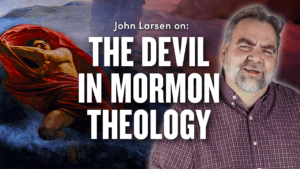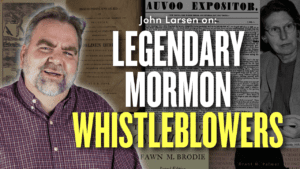From 1904-1907 Congress held a series of hearings on whether Reed Smoot, an LDS apostle who was elected to the Senate, should be seated. The hearing provide a deep look at Mormon practice, history and theology in the congressional record. These hearings and the controversies surrounding them remain a pivotal moment in Mormon History.
SHOW NOTES:
- John Larsen Unitarian Universalist speech
- John Larsen Amazon store – buy him farm tools
- John Larsen’s YouTube Channel
- Donate to Mormon Expression
- Reed Smoot Hearings
- The Mormon Question…by Sarah Gordon
- The Reed Smoot Hearings… by Paulos and Hansen
- The Mormon Church on Trial by Michael Paulos
- Mormon Polygamy: A History by Von Wagoner
- William Clayton’s journals
- Wife No.19 by Ann Eliza Young
- Journal of Discourses
- Rudgar Clawson
- The Life of Brian – Monty Python
- Reed Smoot Hearings (from the Church’s website)
Mormon Stories Related
Mormon Expressions is made possible by generous donors! Help us continue to deliver quality content by becoming a donor today:
John & Carah on Other Platforms:
- John Larsen – From the banks of chaos in my mind
- Mormon Expressions Podcast on Spotify
- Nuancehoe on YouTube
- Nuancehoe on Patreon
- John Larsen on YouTube
Support Mormon Stories Podcast here:
- One-time or recurring donation through Donorbox
- Support us on Patreon
- PayPal
- Venmo
Our Platforms:
- Patreon
- Spotify
- Apple Podcasts
Contact Us:
MormonStories@gmail.com
PO Box 171085, Salt Lake City, UT 84117




2 Responses
I always thought that Reed Smoot was a polygamist and that was what the hearings were about. So this podcast did clear up some misconceptions for me. However I’m more than ever confused about what the real story about Richard Lyman was. In my college church history class it was” adultery”. Then I read a story that he’d been sealed to the woman since the 1920s and his first wife Amy Brown Lyman knew and approved. So another idea for a future episode ?
The post-war period in the South was called Reconstruction. The Reynolds case involved the free exercise clause, not the establishment clause, of the First Amendment. When you make such basic errors, it casts doubt on your other assertions. Don’t be so sloppy.